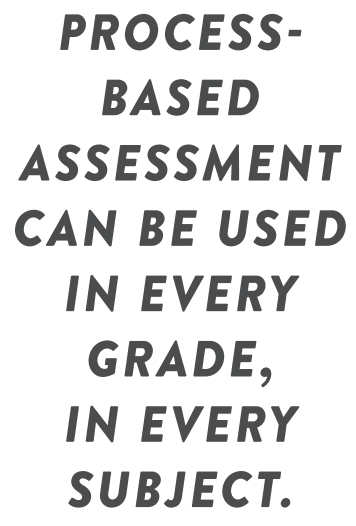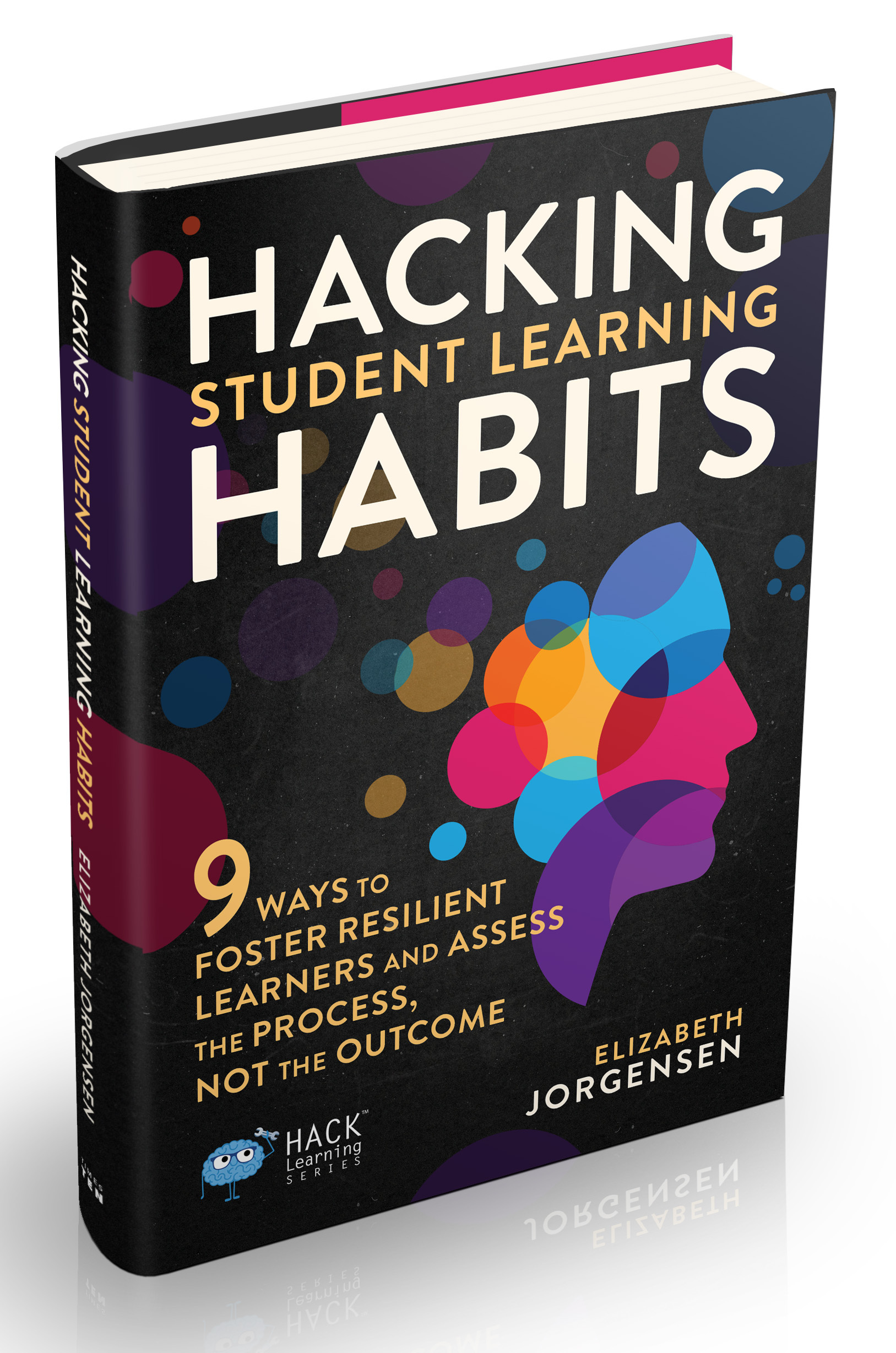Sell Grades and Invest in Process-Based Assessment
Aug 25, 2023
Elizabeth Jorgensen on implementing process-based assessment from Hacking Student Learning Habits.
"This is my dream job."
It was a Wisconsin late-summer evening, and our school’s college essay workshop had just ended. “How can we get this to happen in the fall in our classrooms?” I wanted to carry over the eagerness our workshop students displayed. “How can we get kids to try things out, to commit to learning and growing?”
The college essay workshop felt like a utopian experience, with three teachers collaborating to instruct eager and invested students. Although each could have left at any time, they stayed. The students dedicated themselves to writing the best sentences, transitions, hooks, and conclusions they could. They listened to their classmates and to us, and they applied feedback in meaningful ways.
A decade ago, my writing colleagues and I started offering college essay workshops. They’re a collaborative, gradeless endeavor. Students earn a quarter credit if they come all four days, but the students don’t care about the quarter credit. They care about writing good essays, getting into dream schools, earning scholarships, and receiving grants.
In our writing classes, we had already abandoned rubrics. We found they stifled creativity, prevented risk-taking, and provided a blueprint for blandness. But even without a rubric, we struggled to get kids to commit to their writing, to fully embrace risks, and to follow their passions.
And, without a rubric, I questioned my grading policies. Was I fairly and accurately assessing? I often felt guilty about giving an A, B, or C on an essay about a dying father, a poem about anorexia, a limerick about mental health, or a narrative about self-doubt. Since college essay workshop students flourished in a no-grades environment, was this the answer to motivating students in regular classrooms?
As my colleagues and I explored the ways other teachers built classroom cultures rich in creativity and productivity and assessed their students’ progress, we found our state’s Department of Public Instruction offered a summit.
At the conference, we fleshed out our plan to inspire students to invest, set goals, follow their passions, learn about themselves and their talents, put in daily work, take chances, and experiment. We discussed how to encourage students to really dive in and understand that each part of the process is important, to embrace each assignment as a challenge or opportunity, and to focus not on the grade but on the process.
Process-based assessment helps students build learning habits as they:
- practice skills
- reframe comparison to identify what led to an outcome
- develop a growth mindset
- improve based on feedback
- continue to move forward
- accept imperfection
- enjoy learning and improving
Process-based assessment helps teachers to:
- focus on skill-building rather than grading
- provide guidance and support for students
- work collaboratively with students to develop lifelong, high-yielding habits

In Atomic Habits, James Clear writes about Professor Uelsmann, who divided his students into two groups of photographers. One group, which he named the quantity group, was assessed based on the number of photos captured. The other group, called the quality group, was assessed based on the quality of one image.
At the end of the semester, Professor Uelsmann found that all the best photographs came from the quantity group. The students in that group tried, failed, learned, and grew. They developed skills and made progress through a process of trial and error. In contrast, the quality group found themselves paralyzed by the pursuit of one perfect image.
Similarly, many of our students get stuck on the idea of perfection. They believe an A-plus on a paper or test will provide happiness or indicate future success. They think a thirty-six on the ACT will lead to their dream school, which will lead to their dream job and their dream life. They think one perfect photograph exists. And then, they refuse to try to capture it because they’re convinced they’ll fail.
By removing outcome-based grades and assessing the process, we break our students from this mindset.
Process-based assessment can be used in every grade, in every subject. Start by asking three questions:
- Why do I value the process? Your “why” is your purpose. By knowing why, you’ll be better able to answer questions two and three.
- What are students expected to accomplish? Choose goals that are measurable and attainable.
- How can my classroom center around the process? Identify behaviors or habits that will focus students on learning and growing rather than on earning a grade.
How I answered these questions:
- I want my students to find pleasure in writing, to know their voices matter, to realize writing can be cathartic, to understand that writing is never done or perfect, to take the skills they develop in class and apply them to their lives, to gain confidence, and to know that work and daily attention to detail allow them to improve.
- Students will create pieces they are proud of, enjoy writing, approach their work with confidence and an develop an increased understanding of their strengths and weaknesses while sharing their voices with the world.
- The writing process is not linear. It is different for each student and may include brainstorming, drafting, writing, editing, sharing, revising, submitting, and publishing. To focus on the process rather than the outcome, I will present each part of the writing process with equal importance.
Grades and assessment are not synonymous. Grades are ineffective assessments. Process-based assessments, however, allow students to know how far they are from the goal and how to move closer to it.
Although grades can be part of assessment, assessment is effective because it requires student participation. Assessment relies on a collaborative goal; it encourages conversations and improvements; and it evaluates the process, not the outcome. Do not think of what needs a grade. Instead, consider how assessment can enhance a student’s process and assist them in improving.
Daily habits and a process-based environment encourage students to care about improving their processes rather than earning a grade or achieving an outcome.
A process-based classroom enables students to:
- make mistakes
- learn from their mistakes
- do more of what works and less of what doesn’t
Because we work within a system that requires grades, students earn points for working through the writing process. A process point can be assigned when a student:
- demonstrates growth
- shows progress
- produces work that requires revision
- attempts a step
Receiving a process point does not mean the assignment is perfect, complete, or A-quality work. Conversely, not receiving a process point is not failure, the end of the world, or detrimental to a student’s overall grade.
In class, students read and analyze model texts and peer examples. They research and write. They draft and edit. They peer edit and share drafts with me. They learn from feedback from friends, family, and peers.
Along the way, I pose questions, and I meet students where they are and provide a cheer, reminding them they can and will create beautiful art worthy of sharing. At its core, process-based assessment is about personalized instruction for each student every day to help them create positive learning habits.
My college essay workshop colleagues and I continue to tweak our process-based assessment model. It looks a bit different each year, and we remain open to revising, learning, and growing, just as we ask our students to be. In our journey, we’ve found there is no magic formula to process-based assessment. We can only do what works with this batch of students. We can only do our best work each day.
Help students create effective learning habits and embrace process-based assessment in Hacking Student Learning Habits today.






